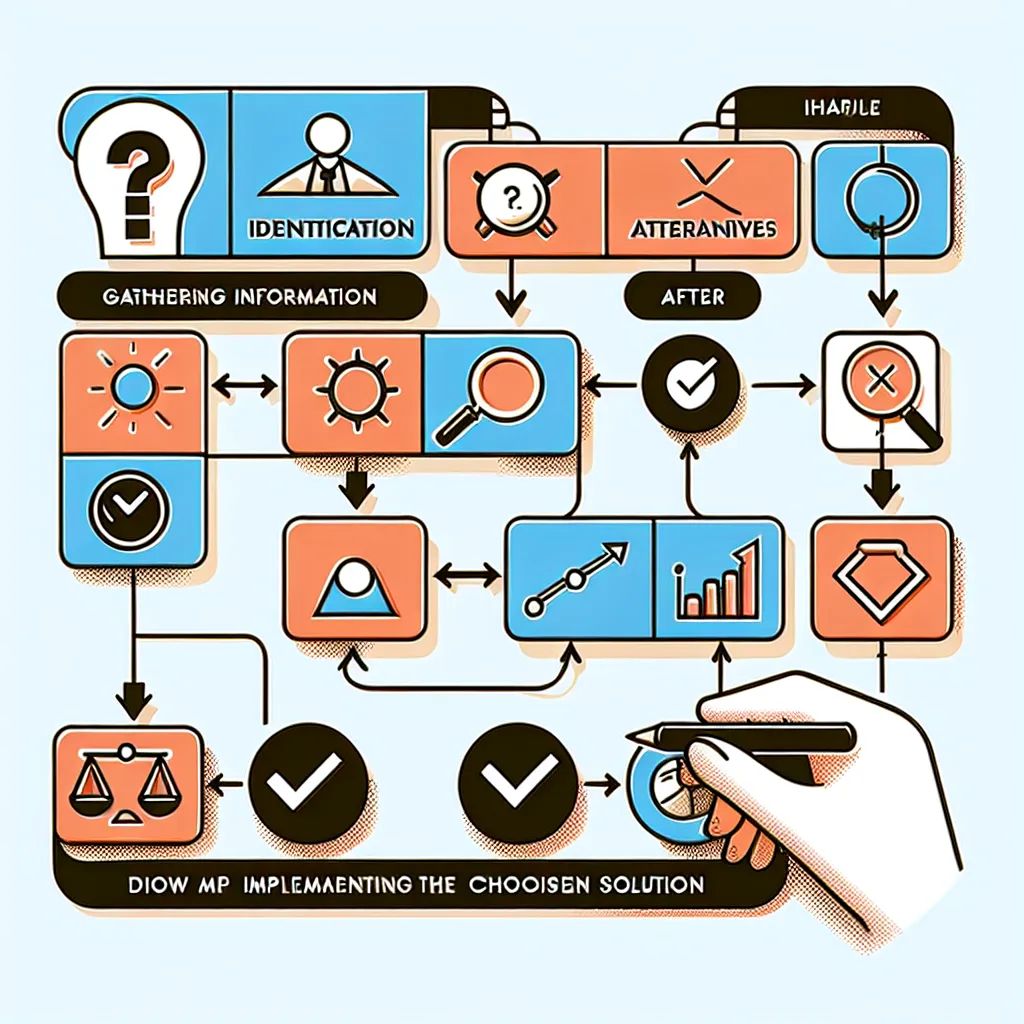In today’s competitive job market, showcasing your decision-making abilities during an interview can significantly increase your chances of landing the desired position. Employers value candidates who can make sound judgments and contribute to the company’s success. This article will guide you through effectively answering questions about your decision-making skills, helping you stand out in your next job interview.
Understanding Decision-Making Abilities
Decision-making is a crucial skill in any professional role. It involves the ability to analyze situations, weigh options, and choose the best course of action. Employers often assess this skill to determine how well a candidate can handle responsibilities and contribute to the organization’s goals.
 Decision Making Process Flowchart
Decision Making Process Flowchart
How Employers Evaluate Decision-Making Skills
When assessing a candidate’s decision-making abilities, employers typically look for:
- Analytical skills
- Problem-solving capabilities
- Ability to work under pressure
- Confidence in making choices
- Consideration of long-term impacts
Common Interview Questions and Sample Answers
Let’s explore some typical questions about decision-making and how to answer them effectively.
1. “Describe a time when you had to make a difficult decision at work.”
Sample Answer: “In my previous role as a project manager, we faced a critical deadline for a major client. Two days before delivery, we discovered a significant flaw in our software. I had to decide whether to inform the client and risk losing the contract or try to fix the issue within the tight timeframe. After careful consideration, I chose to inform the client immediately. I explained the situation, proposed a solution, and requested a short extension. The client appreciated our honesty and agreed to the new timeline. This decision strengthened our relationship and led to more projects in the future.”
2. “How do you approach decision-making when you don’t have all the information?”
Sample Answer: “When faced with incomplete information, I follow a structured approach. First, I identify what crucial information is missing and determine if it’s possible to obtain it quickly. If not, I assess the risks of making a decision with the available data. I then consult with colleagues or experts who might have insights I’m missing. Finally, I make the best decision possible based on the information at hand, always being prepared to adapt as new information becomes available.”
3. “Can you give an example of a time when you had to make a quick decision?”
Sample Answer: “During a live product demonstration for a potential client, our main presentation software crashed. I had seconds to decide how to proceed. Drawing on my knowledge of the product and the client’s needs, I quickly switched to a simplified version of our pitch using just a whiteboard. This impromptu presentation actually allowed for more interaction with the client. They were impressed by our ability to adapt, and we ultimately won the contract.”
Tips for Answering Decision-Making Questions
- Use the STAR method (Situation, Task, Action, Result) to structure your responses.
- Highlight your thought process and the factors you considered.
- Demonstrate how you balance analytical thinking with intuition.
- Show how you learn from both successful and unsuccessful decisions.
- Emphasize your ability to make decisions independently and as part of a team.
Common Mistakes to Avoid
When discussing your decision-making abilities, be careful to avoid these pitfalls:
- Being too vague or general in your examples
- Focusing solely on the outcome without explaining your process
- Overemphasizing your individual role in team decisions
- Failing to acknowledge the potential risks or drawbacks of your decisions
- Not demonstrating adaptability or willingness to change course when necessary
Follow-up Questions and Suggested Responses
Interviewers often ask follow-up questions to delve deeper into your decision-making process. Here are some examples with suggested responses:
-
Q: “How do you handle disagreements when making decisions in a team?”
A: “I believe in open communication and respecting diverse viewpoints. When disagreements arise, I encourage all team members to express their opinions and rationale. We then evaluate each perspective based on its merits and potential outcomes. If consensus can’t be reached, I facilitate a discussion to find common ground or, if necessary, make a final decision based on what’s best for the project and team.” -
Q: “How do you balance making quick decisions with ensuring accuracy?”
A: “I prioritize gathering essential information quickly and efficiently. For time-sensitive decisions, I focus on the most critical factors and potential immediate impacts. I’m also not afraid to make calculated risks when necessary. However, I always follow up and reassess once more information becomes available, ready to adjust the course if needed.” -
Q: “Can you describe a decision you made that didn’t turn out as expected?”
A: “In a previous role, I decided to implement a new project management software without extensive team training, believing it was intuitive enough. This led to initial confusion and decreased productivity. I quickly recognized the error, paused the rollout, and organized comprehensive training sessions. While it delayed our timeline, it ultimately resulted in better adoption and improved efficiency. This experience taught me the importance of thorough preparation and considering all stakeholders when implementing changes.” -
Q: “How do you approach ethical dilemmas in decision-making?”
A: “When faced with ethical dilemmas, I first ensure I understand all perspectives and potential implications. I refer to the company’s code of conduct and ethical guidelines. If necessary, I consult with mentors or ethics officers. Ultimately, I strive to make decisions that uphold integrity, even if they might be challenging in the short term. I believe maintaining ethical standards is crucial for long-term success and personal integrity.” -
Q: “How do you decide when to escalate a decision to higher management?”
A: “I consider escalation when a decision exceeds my authority level or could significantly impact company policies, finances, or reputation. I also escalate if I feel I don’t have all the necessary information or expertise to make an informed decision. Before escalating, I prepare a clear summary of the situation, options considered, and my recommended course of action to facilitate efficient decision-making at the higher level.”
Conclusion
Effectively communicating your decision-making abilities is crucial in job interviews. By preparing thoughtful responses to common questions, using specific examples, and demonstrating a structured approach to decision-making, you can impress potential employers and showcase your value as a candidate. Remember to highlight your analytical skills, ability to work under pressure, and commitment to making informed choices that benefit the organization.
For more insights on succeeding in job interviews, check out our articles on how to answer questions about managing priorities and how to answer questions about problem-solving. These resources will further enhance your interview preparation and boost your confidence in showcasing your professional skills.




